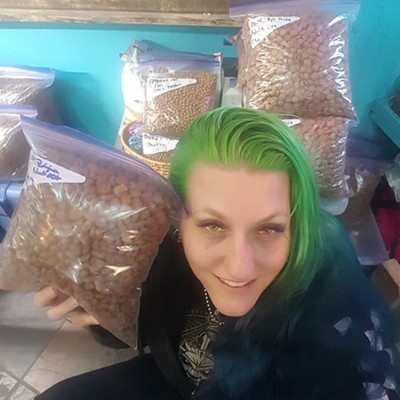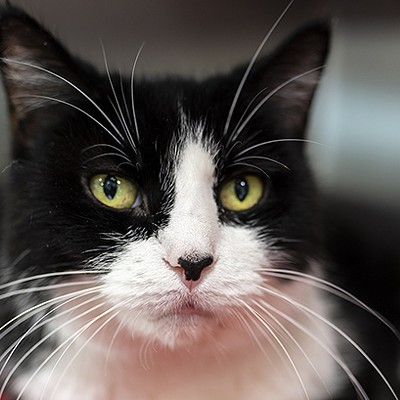But for too many unwanted animals, that second chance dead-ends with shady animal dealers--or even knuckle-draggers seeking fodder for their pit bulls.
The latter crowd speaks for itself, typically in low grunts. But dealers are a different breed. Abusive and greedy, they've been the source of much animal suffering over the decades, and steady providers of raw meat for biomedical research.
For long stretches of time, these animal brokers--licensed as "Class B" dealers by the U.S. Department of Agriculture--have been able to work under the radar. Then a particularly horrific case makes headlines.
Not long ago, just such a story broke about the heinous practices of Martin Creek Kennels in Arkansas. When the feds raided this bleak facility in 2003, they found multitudes of sick animals, decomposing animals--and about a dozen stolen pets which were finally returned to their owners.
To Martin Stephens, the only foolproof way to stop this despicable practice is by outlawing the Class B trade in dogs and cats. Stephens is vice president for animal research issues with the Humane Society of the United States.
"Essentially, these dealers just round up animals to sell to research labs," he says from his office in Washington, D.C. "We're talking about the lives of close to 20,000 cats and dogs every year."
Under their USDA licenses, brokers can legally purchase animals through "random sources." But it's impossible to gauge exactly how many of those 20,000 animals are scooped up in classified ads.
Meanwhile, dealers routinely farm out their dirty work to so-called "bunchers." These unlicensed traffickers tap a variety of means for gathering animals, from picking up strays and stealing pets to acquiring them from shelters or "free to a good home" ads.
The Humane Society and other rescue groups have charged the government with lax oversight of Class B dealers. That task is further complicated by the far-flung distribution webs these dealers employ.
"Part of problem is that these animals are being shipped across state lines," says Stephens. "That's why the dealers are difficult to regulate. And that's why research facilities can say, 'We're not aware of any problems with the Class B dealers we use.'
"How would they be?" he asks. "The person they're dealing with may be in a different state. We've even had instances where a dog turns up at a research facility, and it's ready to be put under the knife when someone thinks to look for a microchip. And the dog turns out to be somebody's pet from three states away."
A majority of Class B dealers are concentrated in Midwestern states. According to Stephens, many are near the research institutions that constitute their primary clients. But in a recent Humane Society poll, many of those same institutions now contend they've stopped buying random source animals. The UA is among them.
Overall, there are only about 10 Class B dealers, down from hundreds a few years ago. Of those, Stephens says, three or four are currently under USDA investigation.
But does that mean that pet owners or animal advocates can rest easier? Hardly, he says. Instead, animal advocates are pushing the Pet Safety and Protection Act. Called "Buck's Bill," after a mistreated hound rescued from a dealer, the measure would prohibit research facilities from buying dogs and cats from Class B dealers.
The timing is right, says Stephens. He notes that even researchers have dropped their fierce opposition. "I think many in the research community support this bill. The way that support is revealed is that they're quiet about it--they're not actively opposing it."
Stephens pauses. "We don't know how long this system would take to die out on its own," he says. "But we've had enough."
Introduced in Congress this spring, the measure awaits a committee hearing.
But Peter Reinthal says versions of that law "have been around for about 20 years." And he's not holding his breath for it to be fast-tracked anytime soon. Reinthal is a UA professor and vice president of Delta Biologicals, a Class B dealer in Tucson. Unlike other such dealers across the nation, Delta purchases already euthanized and preserved animals.
The company's catalogue is long, and prices vary. A frozen "turtle pail pack" starts at $8, while vacuum-packed cats can run up to $46.
Counting school districts and universities among Delta's primary clients, Reinthal says his company accounts to the federal government like clockwork. "Under the USDA, we have to record every animal that's received, and every one sold."
His providers often get animals "from the shelters that will sell them euthanized carcasses," he says. And he tries to weed out the bad bunchers. "I usually inquire as to what their sources are. If they're going to make up some elaborate cover-up, then I may not be able to determine for sure.
"But I feel I do everything possible to make sure these animal are legally obtained, humanely treated and euthanized according to standards set by the American Veterinary Society (of Animal Behavior)."
But even with new laws--and the caution claimed by dealers like Reinthal--there's only one way to ensure an end to unethical trafficking in dogs and cats. And that's by stopping the supply.
"I'd advise anyone against advertising (pets) on Craigslist, or other places where you're not able to screen people." says Jessica Shuman, a busy animal rescuer in Tucson.
Instead, she recommends finding animals new homes through the Humane Society and other adoption groups. These organizations add several layers of scrutiny and generally require a fee for those hoping to adopt.
"I think people who list their animals on Craigslist probably have the best of intentions," Shuman says. "But it's an issue regardless, because you never know the intent of people answering your ad ... You just don't know."












